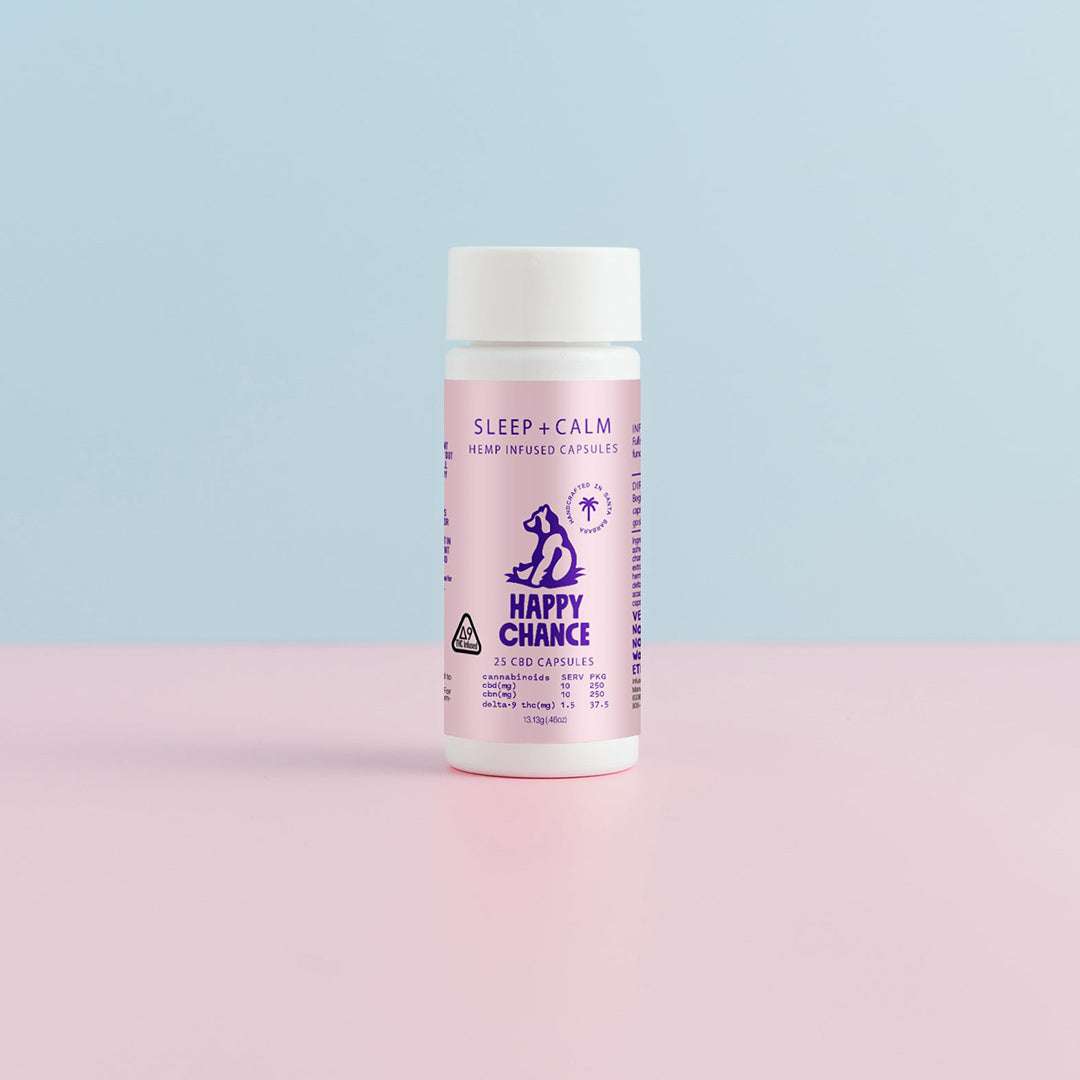Getting a restful night’s sleep and finding relief from daily stress can be challenging. Many people today are exploring natural ways to improve sleep quality, manage stress, or find relief from discomfort. Cannabinol, commonly known as CBN, has recently emerged as an intriguing option for individuals seeking gentle yet effective support without the strong psychoactive effects typically associated with cannabis products. Although not as widely discussed as THC or CBD, CBN offers unique potential benefits worth understanding.
In this blog, we'll clearly explain what CBN is, highlight its potential therapeutic effects and side effects, and discuss how it might fit into your personal wellness routine.
What Is CBN?
CBN, short for cannabinol, is a natural compound that is derived from the cannabis plant.
THC (tetrahydrocannabinol) is the primary psychoactive component of cannabis. It degrades over time, eventually losing its potency and diminishing psychoactive effects. As it gets exposed to oxygen and light, THC converts into CBN and other compounds.
This cannabinoid is more widely known as the "sleepy cannabinoid." This is a name given to the plant by experienced cannabis users who enjoy older cannabis strains for sleep support because it has higher levels of CBN. It is more effective when it is used alongside other cannabinoids for sleep improvement, relaxation, and other pain relief benefits.
How Does CBN Work? What Does Science Say?
CBN has been suggested to have sedative properties and may contribute to the sleep-inducing effects of certain cannabis strains. It helps people who have insomnia and often struggle with sleep. Compared to other cannabinoids, such as CBD and THC, CBN is not that abundant. It is not well researched, but a recent study showed findings and suggested that 20 mg of CBN taken nightly may help improve overall sleep disturbance, including the number of times one wakes up throughout the night without impacting daytime fatigue.
As a byproduct of degraded THC, CBN interacts with the endocannabinoid system (ECS), primarily targeting the CB2 and CB1 cannabinoid receptors. It acts as a partial agonist for both receptors, modulating their activity and downstream signaling pathways. Through these interactions, CBN exhibits diverse effects on various physiological processes. But as it doesn’t create a strong bond with CB1 receptors, it does not yield any intoxication effects. For maximum effects, you’ll find CBN alongside CBG and other minor cannabinoids in hemp-derived wellness products that feature high concentrations of CBD for maximum benefits.
Benefits & Uses Of CBN
As compared to CBD or THC, there's very little knowledge and studies that tend to back up the benefits that CBN could provide. However, some of the widely known benefits include:
Improves Sleep
There are indications that CBN has sleep-promoting capabilities and helps improve restful sleep. It can help improve conditions such as Insomnia and other sleep disorders. However, more research is required to know what effects it can possibly have. Moreover, when it is combined with THC, some users might see amplified effects.
You can also experience restful and uninterrupted sleep with our Happy Chance Sleep + Calm Capsules. Crafted with hemp-derived delta-9 THC, CBD, and CBN, each capsule is designed to bring you into a deep state of relaxation, soothing both mind and body.
Relieves Pain
CBN has also been shown to minimize chronic pain. It tends to influence the activity of neurons that are sensitive to capsaicin. Capsaicin is added to many topical pain relievers to help minimize pain. These nerves are important and are responsible for signaling to the body for pain and perception. Studies also show that pain relief was better-taken care of when CBD and CBN were combined together.
With Happy Chance Relief + Relax Capsules, you can experience soothing relief and ultimate relaxation. Crafted with a blend of delta-9 THC (hemp-derived), CBD, and CBG, our capsules are designed to ease aches and provide comfort.
Anti-Bacterial Effects
CBN also has the ability to fight bacteria. According to a study, CBN is one of several cannabinoids (including CBD) that are effective in treating MRSA, a bacterial infection that is resistant to antibiotics.
Bone Healing & Growth
Research suggests that cannabinoids, including CBN, may play an important role in bone healing and growth by activating stem cells and promoting bone formation, potentially aiding in fracture recovery and bone loss prevention.
It is important to understand that there is a lot more research that still needs to be done to have a better understanding of how CBN can affect the body and other ways that it can be helpful in aiding sleep or other health-related problems.
CBN vs. CBD vs. THC: What’s the Difference?
There are over 130 known compounds in the cannabis plant. Each cannabinoid offers its own set of medicinal benefits and effects.
CBN vs. CBD
While CBD and CBN share some similarities, they have distinct differences in their origins, psychoactive properties, and therapeutic uses.
Chemical Composition & Origin
Undoubtedly, CBD and CBN are both derived from the same plant, but they originate from different processes. CBD is a primary component in the hemp plant as it is abundantly available in cannabis plants. On the other hand, CBN is a secondary cannabinoid that forms after THC degrades and ages over time.
Psychoactive Properties:
One of the major differences between CBD and CBN is their psychoactive effects and properties. CBD doesn’t get you ‘high,’ or effects that can include feelings of relaxation and well-being. This makes it a popular choice for those who are only looking to seek therapeutic benefits. While CBN is also considered to be non-psychoactive, it still does have some mild psychoactive effects. However, it is important to know that these effects are far less than those contained in THC.
Interaction with Receptors:
CB1 receptors are predominantly found in the brain and central nervous system, while CB2 receptors are more abundant in the immune system. CBD’s interaction is more focused on peripheral systems and has a primary affinity for CB2 receptors. CBN has quite a lower affinity for CB1 and CB2 receptors if we compare it to CBD and THC, which is why its broad spectrum has many effects.
CBN Vs. THC
THC is stronger than CBN, so CBN can be understood as the weaker version of THC. Here is what sets them apart:
Source and Production:
THC is a primary component in the hemp plant, while CBN is created when THC is degraded, whether due to its exposure to oxygen and light. So, we can say that CBN is made from a matured or an older plant of cannabis.
Psychoactive Properties & Effects:
Both CBN and THC have the potential to give you that ‘high’ effect, but the intensity and the level of this ‘high’ differs. CBN isn’t entirely psychoactive; its potency is significantly milder. Though CBN is just ¼ as strong as THC, it is known that it tends to create a drowsier impact when we compare it to THC.
Interaction With Receptors:
CBN attaches to both CB1 and CB2 cannabinoid receptors. This engagement sets it apart from most cannabinoids, including THC. Due to which it can potentially contribute to its effects on sleep, pain, and other physiological processes.
Potential Risks & Side Effects Of CBN
While CBN is generally considered safe, it's important to be aware of potential side effects and risks. As with any supplement or wellness product, it is advisable to consult a healthcare professional before incorporating CBN into your routine, especially if you are pregnant, nursing, taking medications, or have any existing medical conditions.
Here are some common side effects that you may encounter:
Drowsiness and Fatigue:
One of the most commonly reported side effects of CBN is drowsiness. Because CBN is frequently used to support sleep, it can cause excessive tiredness or fatigue, especially when used in larger doses or during daytime hours.
Dizziness or Lightheadedness:
Some individuals may experience mild dizziness or a sensation of lightheadedness after consuming CBN. This effect is typically brief and may diminish over time or with lower doses.
Changes in Appetite:
CBN can potentially influence appetite, leading to either increased or decreased feelings of hunger in some users. The impact on appetite tends to vary depending on individual response and dosage.
Interactions with Medications:
Due to its calming effects, CBN may enhance the sedative properties of certain medications, including sleep aids, sedatives, and prescription drugs. If you are currently taking medication, it’s important to consult your healthcare provider before adding CBN to your wellness regimen.
How To Consume CBN and CBD
CBD and CBN can come in a variety of forms that are easily available at medical stores, pharmacies, local grocery stores, or dispensaries.
You can easily consume it as:
- Capsules
- Gummies
- Oil
- Edibles
- Tinctures
- Vape Pens
At Happy Chance, our capsules bring the ingredients together. We source our cannabis carefully and use only the best ingredients, ensuring that each product delivers function and performance. With Happy Chance, you’re choosing an experience that’s as enjoyable today as it will be tomorrow.
The Takeaway
While there is so much research that is still left to be done on CBN because of its lack of abundance as compared to THC and CBD, it still shows some very promising results and benefits. If you’re struggling with sleep and are curious about trying CBD to boost your concentration, consider exploring what we at Happy Chance have to offer. Feel free to browse our website and take a look at our products to see which option best suits your needs.


